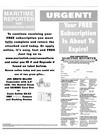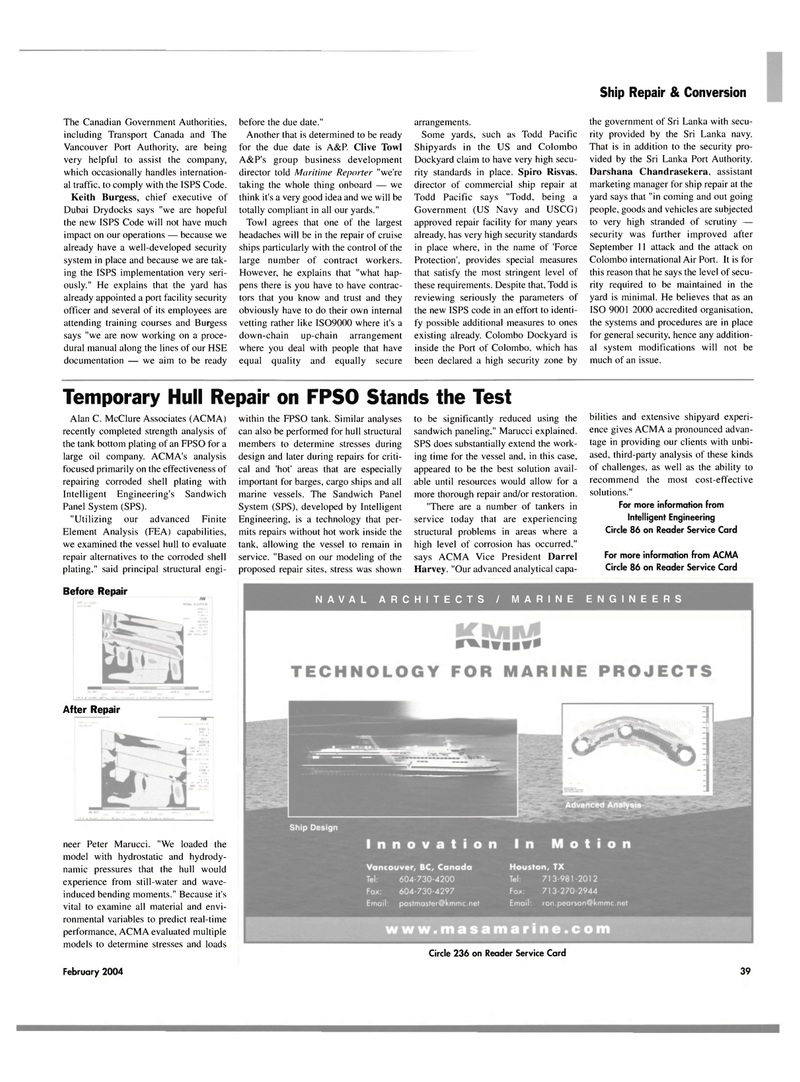
Page 44: of Maritime Reporter Magazine (February 2004)
The Tanker Yearbook: ATB Edition
Read this page in Pdf, Flash or Html5 edition of February 2004 Maritime Reporter Magazine
Ship Repair & Conversion
The Canadian Government Authorities, including Transport Canada and The
Vancouver Port Authority, are being very helpful to assist the company, which occasionally handles internation- al traffic, to comply with the ISPS Code.
Keith Burgess, chief executive of
Dubai Drydocks says "we are hopeful the new ISPS Code will not have much impact on our operations — because we already have a well-developed security system in place and because we are tak- ing the ISPS implementation very seri- ously." He explains that the yard has already appointed a port facility security officer and several of its employees are attending training courses and Burgess says "we are now working on a proce- dural manual along the lines of our HSE documentation — we aim to be ready before the due date."
Another that is determined to be ready for the due date is A&P. Clive Towl
A&P's group business development director told Maritime Reporter "we're taking the whole thing onboard — we think it's a very good idea and we will be totally compliant in all our yards."
Towl agrees that one of the largest headaches will be in the repair of cruise ships particularly with the control of the large number of contract workers.
However, he explains that "what hap- pens there is you have to have contrac- tors that you know and trust and they obviously have to do their own internal vetting rather like IS09000 where it's a down-chain up-chain arrangement where you deal with people that have equal quality and equally secure arrangements.
Some yards, such as Todd Pacific
Shipyards in the US and Colombo
Dockyard claim to have very high secu- rity standards in place. Spiro Risvas. director of commercial ship repair at
Todd Pacific says "Todd, being a
Government (US Navy and USCG) approved repair facility for many years already, has very high security standards in place where, in the name of 'Force
Protection', provides special measures that satisfy the most stringent level of these requirements. Despite that, Todd is reviewing seriously the parameters of the new ISPS code in an effort to identi- fy possible additional measures to ones existing already. Colombo Dockyard is inside the Port of Colombo, which has been declared a high security zone by the government of Sri Lanka with secu- rity provided by the Sri Lanka navy.
That is in addition to the security pro- vided by the Sri Lanka Port Authority.
Darshana Chandrasekera, assistant marketing manager for ship repair at the yard says that "in coming and out going people, goods and vehicles are subjected to very high stranded of scrutiny — security was further improved after
September 11 attack and the attack on
Colombo international Air Port. It is for this reason that he says the level of secu- rity required to be maintained in the yard is minimal. He believes that as an
ISO 9001 2000 accredited organisation, the systems and procedures are in place for general security, hence any addition- al system modifications will not be much of an issue.
Temporary Hull Repair on FPSO Stands the Test
Alan C. McClure Associates (ACMA) recently completed strength analysis of the tank bottom plating of an FPSO for a large oil company. ACMA's analysis focused primarily on the effectiveness of repairing corroded shell plating with
Intelligent Engineering's Sandwich
Panel System (SPS). "Utilizing our advanced Finite
Element Analysis (FEA) capabilities, we examined the vessel hull to evaluate repair alternatives to the corroded shell plating," said principal structural engi-
Before Repair
After Repair within the FPSO tank. Similar analyses can also be performed for hull structural members to determine stresses during design and later during repairs for criti- cal and 'hot' areas that are especially important for barges, cargo ships and all marine vessels. The Sandwich Panel
System (SPS), developed by Intelligent
Engineering, is a technology that per- mits repairs without hot work inside the tank, allowing the vessel to remain in service. "Based on our modeling of the proposed repair sites, stress was shown to be significantly reduced using the sandwich paneling," Marucci explained.
SPS does substantially extend the work- ing time for the vessel and, in this case, appeared to be the best solution avail- able until resources would allow for a more thorough repair and/or restoration. "There are a number of tankers in service today that are experiencing structural problems in areas where a high level of corrosion has occurred," says ACMA Vice President Darrel
Harvey. "Our advanced analytical capa- bilities and extensive shipyard experi- ence gives ACMA a pronounced advan- tage in providing our clients with unbi- ased, third-party analysis of these kinds of challenges, as well as the ability to recommend the most cost-effective solutions."
For more information from
Intelligent Engineering
Circle 86 on Reader Service Card
For more information from ACMA
Circle 86 on Reader Service Card neer Peter Marucci. "We loaded the model with hydrostatic and hydrody- namic pressures that the hull would experience from still-water and wave- induced bending moments." Because it's vital to examine all material and envi- ronmental variables to predict real-time performance, ACMA evaluated multiple models to determine stresses and loads
NAVAL ARCHITECTS / MARINE ENGINEERS
Circle 236 on Reader Service Card
February 2004 39

 43
43

 45
45
